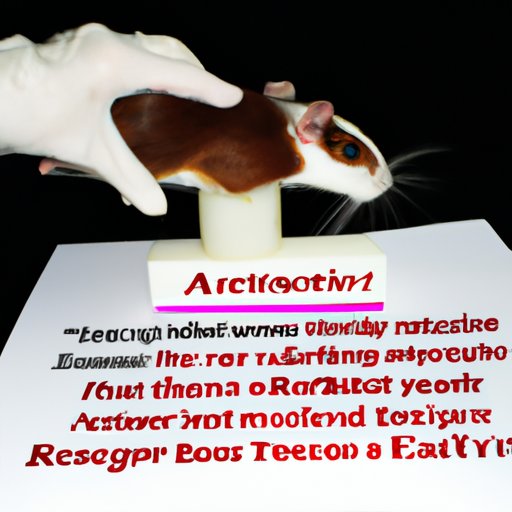Introduction
Animal testing has long been a controversial issue within the scientific community. It involves the use of animals for the purpose of scientific research, and is often used to test the safety and efficacy of products such as drugs, cosmetics, and even food items. While animal testing can be beneficial in some cases, it also raises serious ethical and practical concerns. In this article, we will explore how animal testing is bad science, looking at the moral, reliability and health implications of this practice.
Highlighting the Moral Implications of Animal Testing
The most obvious moral concern with animal testing is that it involves the inhumane treatment of animals. Many animals are subjected to cruel and painful experiments, including those involving physical restraint, forced feeding and the infliction of pain or death. This goes against the basic principles of animal welfare, and is something that many people find morally reprehensible.
Another moral issue with animal testing is that it involves the use of animals without their consent. Animals are unable to give informed consent to the experiments being conducted on them, and so they are effectively being used as guinea pigs. This raises serious ethical questions regarding the use of animals in scientific research.

Showing How Animal Testing is Unreliable and Inaccurate
One of the key problems with animal testing is that it often produces inconsistent and irreproducible results. Studies have shown that the same experiment performed on different animals can yield vastly different results, making it difficult to draw reliable conclusions. Furthermore, it is often difficult to replicate the results of animal tests in other laboratories, due to the complexity of the experiments and the fact that every animal is different.
In addition, animal tests are often too simplistic to accurately reflect the effects of a drug or chemical in humans. For example, a drug may have an effect on a mouse, but this does not necessarily mean it will have the same effect on humans. This means that animal tests can often be misleading, leading researchers to draw inaccurate conclusions about the safety or efficacy of a product.

Exploring Alternatives to Animal Testing
Fortunately, there are a number of alternatives to animal testing that can produce more reliable and accurate results. Computer modelling is one such alternative, as it allows researchers to simulate the effects of a drug or chemical in a virtual environment. This can be used to determine the safety and efficacy of a product without having to subject animals to cruel and painful experiments.
Human cell cultures are another alternative to animal testing. These involve culturing human cells in a laboratory setting, and can be used to study the effects of a drug or chemical on human cells. This can provide more accurate results than animal tests, as the cells are from humans rather than animals.
Examining the Psychological Distress Caused to Animals by Testing
In addition to the physical suffering caused to animals by testing, there is also the psychological distress caused by the experience. Animals are often subjected to fear and anxiety during experiments, due to the unfamiliar environment and the presence of people. This can lead to significant stress and mental anguish, which is something that should not be ignored.
Moreover, many animals are subjected to physical and mental abuse during experiments. This includes the infliction of pain, electric shocks and other forms of punishment. This is clearly unacceptable, and goes against the basic principles of animal welfare.

Discussing the Costs Associated with Animal Testing
Animal testing is also expensive, both financially and in terms of time. The cost of keeping animals in laboratories, buying equipment and conducting experiments can add up quickly. Furthermore, it can take a considerable amount of time to conduct experiments, meaning that researchers have to wait longer for results.
This can have a negative impact on the progress of research, as experiments must be repeated multiple times in order to obtain reliable results. This means that researchers have to spend more money and time conducting experiments, which can slow down the process of scientific discovery.

Demonstrating How Animal Testing is Not a Necessary Component of Scientific Research
It is also important to note that animal testing is not always necessary for scientific research. In many cases, alternative methods such as computer modelling and human cell cultures can provide more reliable and accurate results. Furthermore, animal tests often do not reflect the effects of a drug or chemical in humans, making them irrelevant in certain cases.
In addition, animal tests often fail to adequately represent the diversity of the human population. For example, experiments conducted on mice may not be applicable to humans, due to the differences between the two species. This means that animal tests cannot always provide an accurate picture of the potential effects of a drug or chemical in humans.
Analyzing the Negative Impacts of Animal Testing on Public Health
Finally, it is important to consider the potential negative impacts of animal testing on public health. Animal tests can often produce false positives or false negatives, leading to inaccurate conclusions about the safety or efficacy of a product. This can have serious implications for public health, as people may be exposed to dangerous substances if animal tests are relied upon.
In addition, there is always the risk of contamination when using animals in experiments. This can lead to the spread of diseases, which can have serious consequences for public health. Therefore, it is important to consider the potential risks associated with animal testing before relying on it.
Conclusion
In conclusion, animal testing is a form of bad science due to the moral, reliability and health implications of this practice. Animals are subjected to cruel and painful experiments without their consent, and the results of these tests can often be unreliable and inaccurate. Furthermore, animal tests can be expensive and time consuming, and there are often better alternatives available. Finally, animal tests can have serious implications for public health, due to the risk of contamination and the possibility of producing false results. Therefore, it is important to consider all of these factors when deciding whether or not to use animal testing in scientific research.
It is clear that animal testing is a form of bad science that should no longer be used. We must focus on developing alternatives to animal testing, and strive to create a world where animals are treated with respect and compassion. Only then can we ensure that scientific research is conducted ethically and responsibly.
(Note: Is this article not meeting your expectations? Do you have knowledge or insights to share? Unlock new opportunities and expand your reach by joining our authors team. Click Registration to join us and share your expertise with our readers.)
